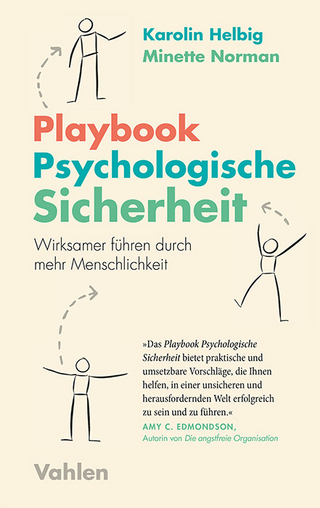
The Cambridge Handbook of Technology and Employee Behavior
Cambridge University Press (Verlag)
978-1-108-70132-7 (ISBN)
Richard N. Landers is Associate Professor, John P. Campbell Distinguished Professor of Industrial and Organizational Psychology, Department of Psychology, University of Minnesota.
Part I. Technology in IO Psychology: 1. The existential threat to IO psychology revealed by rapid technological change; 2. Filling the IO/technology void: technology and training in IO psychology; 3. The reciprocal roles of artificial intelligence and industrial-organizational psychology; Part II. Technology in Staffing: 4. The next wave of internet-based recruitment; 5. Applicant reactions in employee recruitment and selection: the role of technology; 6. Applying adaptive approaches to talent management practices; 7. Playing with a purpose: the role of games and gamification in modern assessment practices; 8. Mobile assessment in personnel testing: theoretical and practical implications; 9. The state of technology-enabled simulations: where are we? Where are we going?; 10. The use of social media in staffing; Part III. Technology in training and development: 11. Gamification of adult learning: gamifying employee training and development; 12. Real career development with virtual mentoring: past, present and future; 13. Professional coaching: the impact of virtual coaching on practice and research; 14. Virtual reality training in organizations; Part IV. Technology in Leadership and Teams: 15. Leading from a distance: advancements in virtual leadership research; 16. Managing distributed work: theorizing an IPO framework; 17. Virtual teams: conceptualization, integrative review, and research recommendations; 18. Social media and teamwork: formation, process, and outcomes; Part V. Technology in Motivation and Performance: 19. Telework: outcomes and facilitators for employees; 20. A review and extension of cyber-deviance literature: why it likely persists; 21. Information communication technology and employee well-being: understanding the 'iParadox Triad' at work; 22. Technology and the aging worker: a review and agenda for future research; 23. The role of technology in the work-family interface; 24. Work in the developing world: technology as a barrier, technology as an enabler; 25. I spy: a research agenda for the study of workplace surveillance and privacy; Part VI. Technology in Statistics and Research Methods: 26. Raising the ante: technological advances in IO psychology; 27. Data science as a new foundation for insightful, reproducible and trustworthy social science; 28. Lost in the crowd: crowdsourcing as a research method; 29. Research in the era of sensing technologies and wearables; 30. Storytelling and sensemaking through data visualization; Part VII. Interdisciplinary Perspectives on Employees and Technology: 31. Microblogging behavior and technology adoption at the workplace; 32. Advantages and unintended consequences of using electronic human resource management (eHRM) processes; 33. Technology and social evaluation: implications for individuals and organizations.
| Erscheinungsdatum | 18.03.2019 |
|---|---|
| Reihe/Serie | Cambridge Handbooks in Psychology |
| Zusatzinfo | Worked examples or Exercises; 27 Tables, black and white; 6 Halftones, black and white; 32 Line drawings, black and white |
| Verlagsort | Cambridge |
| Sprache | englisch |
| Maße | 175 x 252 mm |
| Gewicht | 1820 g |
| Themenwelt | Geisteswissenschaften ► Psychologie ► Arbeits- und Organisationspsychologie |
| Geisteswissenschaften ► Psychologie ► Sozialpsychologie | |
| Wirtschaft ► Betriebswirtschaft / Management ► Unternehmensführung / Management | |
| ISBN-10 | 1-108-70132-9 / 1108701329 |
| ISBN-13 | 978-1-108-70132-7 / 9781108701327 |
| Zustand | Neuware |
| Informationen gemäß Produktsicherheitsverordnung (GPSR) | |
| Haben Sie eine Frage zum Produkt? |
aus dem Bereich


